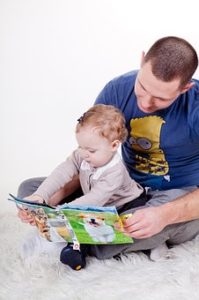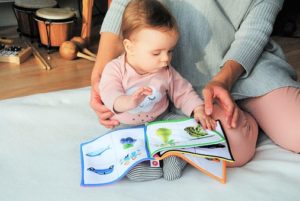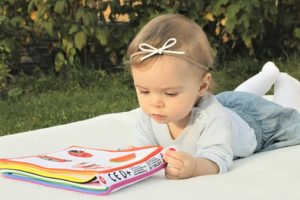Reading is a skill that every parent wishes for their child to learn. It is something that can be frustrating to teach, however. There are ways to begin setting a foundation for good reading before you even show your child their first printed word. How is it possible to give your child a good head start with their reading from the earliest moment?

Speak to Your Child
From the moment you find out you are pregnant, begin speaking to your child. It may seem funny or embarrassing at first, but as your child grows he (or she) will begin to babble back to you in attempted conversation. Your unborn baby will begin to hear around 18 weeks into the pregnancy, so use this opportunity to expose him to a variety of different sounds. Once your baby begins to move, you will really experience feedback with his or her movements in reaction to your voice or your spouse’s voice.
Once your baby is born, speak with him or her as you carry him/her around and as you go about your day. Don’t be afraid to explain things in detail. Talk to your baby as you do things and tell them what you are doing. Say things like, “Now we are going to make lunch. What should we make today? Here are some bananas and peanut butter.” Even if your baby doesn’t understand every detail at first, it encourages him/her to try out new words himself as they get older. Babies respond to so many things that you do and learning words from the very beginning is a great start.
Use a Large Vocabulary
When speaking to your baby, use a wide variety of words in your vocabulary. Don’t be afraid to include words that are difficult to pronounce or understand. Using big words encourages an expansion of your baby’s vocabulary, and he/she will understand them as he/she grows.
You will really begin to have fun as they approach about fifteen to eighteen months old. Their vocabulary starts to grow weekly and when they hit two years old you’ll begin to wonder where they learned all the words they are coming out with.

Read to Your Child
There is no such thing as too much reading. Reading to your child opens the doors to his/her imagination. It exposes him/her to new sounds that you might not otherwise include in your daily conversation and gives him/her something to look forward to. Time spent reading with you or your spouse will imprint positive memories with your child and encourage a love for reading.
Rhyme with Your Child
Rhyming is a wonderful way to help your child lay a foundation for reading. Give your child examples of rhyming, and then ask him/her to give you a few. A great way to teach rhyming is to point to a body part and give a rhyming word for that body part. Then ask him/her to name the rhyming body part. Giving your child clues such as these helps them to learn the concept quickly, and soon he/she will be able to create rhyming words without any assistance.

Foreign Languages
Studies have shown that the more sounds an infant is exposed to, the greater the capacity they will have to learn to speak those sounds later. Speaking a large variety of words while your child is young in any language, including foreign languages, will allow him to become fluent more easily later on.
Teaching your child to read is a process that involves time and patience. It is well worth the effort since it will bring huge benefits to their life. Be sure to lay a foundation for reading long before your child is old enough to read by themselves. By following these simple rules, your child will be on their way to becoming an avid reader in no time at all.
